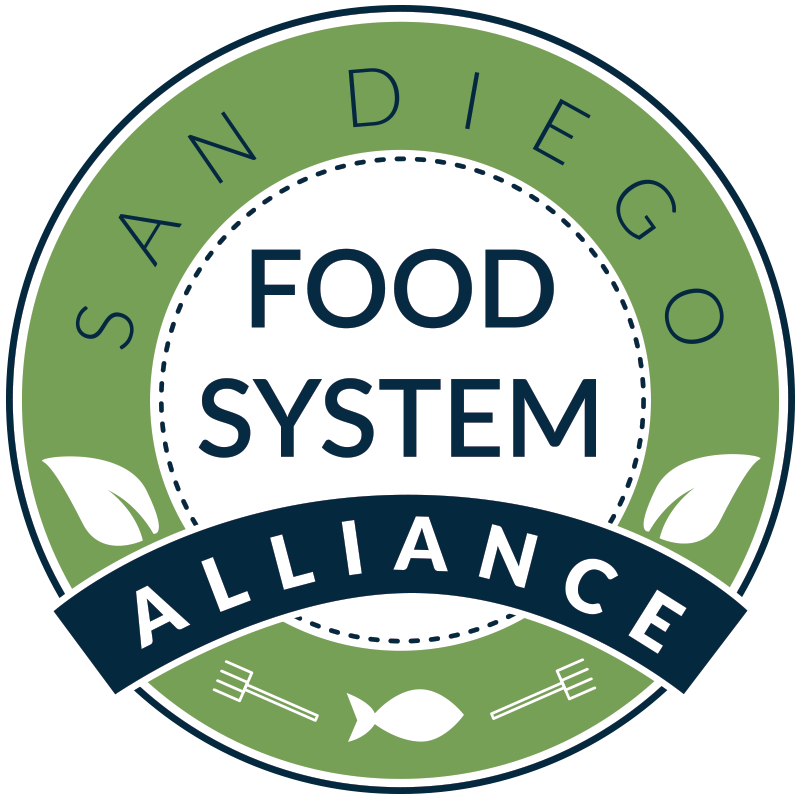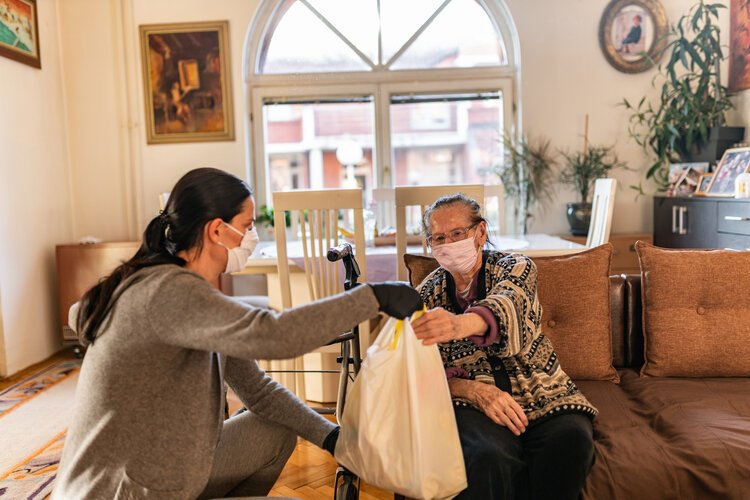7 Things You Can Do Now to Support Our Local Farm & Food Economy
Things may feel out of our control at the moment, but there are several actions we can take as consumers to support our local farm and food economy through the COVID-19 crisis, and move our society toward building long-term resilience.
Left: The farm stand at Chino Farms in Rancho Santa Fe; Right: Tuna Harbor Dockside Market
1) Buy direct from local farmers and fishermen
Small farms and fisheries have lost vital avenues of income during COVID-19 with restaurant and school closures, and farmers market interruptions.
Open-air farm stands, farmers markets, and fishermen’s markets are currently successfully implementing social distancing measures to ensure that shopping is safe. Online ordering, CSA, delivery, and curbside pickup are all convenient, no-touch ways that farms and fisheries have implemented to ensure customers have a dependable source for healthy, fresh food.
See our list of resources for finding a farmer or fisherman near you
2) Support local, independently owned restaurants and food businesses
Restaurants are among the hardest-hit businesses during COVID-19. It only takes a quick walk or ride down your usual restaurant row to know there has been a heartbreaking decline in business. Those that have remained open must follow rapidly changing local regulations, and make hard decisions daily between protecting livelihoods or protecting worker health.
Continue to support your local eateries by ordering take-out and delivery. Order direct from restaurants as much as possible, rather than through third party apps. Contribute to fundraisers. Buy gift cards. Spread the word in your community and on social media to encourage others to do the same.
See our list of resources for supporting restaurants
3) Donate to relief funds
Federal relief for COVID-19 does include funds for food and agriculture; however, the legislation doesn’t go far enough to specifically protect small- and mid-scale farmers, food workers, or local food businesses hit hard by this crisis. It also fails to expand benefits for families already struggling with hunger and farmworkers who are the backbone of our food system but are among the least protected in society.
Flexible financial relief is urgently needed to cover a range of unique emergency expenses, ranging from rent relief to increased community resources. Several nonprofit organizations, community coalitions, and grantmaking bodies have stepped up to raise funds and funnel flexible relief where federal efforts fall short.
See our list of relief funds that are serving our local food system
Volunteer to prepare or deliver meals for homebound seniors and other vulnerable people.
4) Volunteer to support food assistance
Food banks and pantries are in desperate need of dependable volunteers as the demand for food assistance dramatically increases. With unemployment higher than ever and schools closed for the rest of the school year, more and more San Diegans are finding themselves food insecure, many for the first time.
The San Diego Food Bank is actively seeking volunteers in its two warehouse locations and has implemented several precautions to ensure social distancing and safety for volunteers. Meals on Wheels, Mama’s Kitchen, and Jewish Family Service are also seeking volunteers to prepare or deliver meals for homebound seniors and other vulnerable people.
See our list of ways to volunteer for food assistance
5) Learn about the root causes of our food system issues
Many issues plaguing our food system have come to light during the pandemic, including the lack of protection for farm workers, fragility of consolidated food chains, inequitable access to healthy food, and much more. Unfortunately, these are not new problems. They are simply being exposed and exacerbated by emergency conditions.
Not all hope is lost. As consumers, we can choose to make food choices informed by the knowledge of how our system works. For those of us in the fortunate position of having extra time during ‘Safer at Home’ orders, this is a perfect time to reflect. “How does the food system actually work? Who does it work for, and who does it leave behind? How does the economy work? Who does it work for, and who does it leave behind?”
Recognizing the mosaic of diverse actors who bring our food from farm to table is the beginning of truly understanding the meaning behind the food on our plates.
Get involved on a local level. Local policies and programs are often at the forefront of food systems change.
Get involved on a local level. Local policies and programs are often at the forefront of food systems change.
6) Use your vote and your voice to advocate for lasting change
The individual actions we take as consumers—opting to buy direct, supporting local restaurants, and learning about our systems—do make incremental change in our food economy. But we need our elected officials to listen and lead change on a larger scale.
Use your vote and your voice to bring attention to the issues you care about, and to defend those who are most vulnerable in our current food system and economy. Call your representatives in Congress to urge them to prioritize what is important to you.
Get involved on a local level as well. Local government policies and programs are often at the forefront of food systems change. These initiatives have transformed communities and serve as models for state and federal policy improvements.
Check the ‘Latest Announcements’ section on our COVID-19 page for policy-related calls to action.
Visit our Advocacy page for an introduction to Food Policy.
7) Make a commitment to keep taking action after the pandemic
Taking all of these actions now unfortunately won’t mean much if we don’t continue to do so after the pandemic ends.
We need to support our local farmers, fishermen, restaurants, and food businesses all the time, not just in emergencies when they are on the brink of permanent loss, or when our mainstream food chain is letting us down.
We need to care about our interconnectedness as human beings by sharing our time and resources when we can, with those who are disenfranchised by the current system.
We need to participate in conversations and decision-making spaces to ensure that we speak up for the issues we care about, and to hold our leaders accountable.
What’s at stake?
Local food and farm economies, once lost, are quickly absorbed into a massive, industrial-scale food system that fails to provide for everyone. The more consolidated our food supply is under this system, the more susceptible the chain is to future disruption and continued inequity.
A just food system depends on the active participation of all people. We leverage the political power of local communities, public involvement, and activism to transform systems.
Now is the time for us to act in solidarity for a more local, resilient, equitable food economy.



